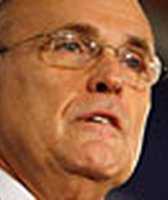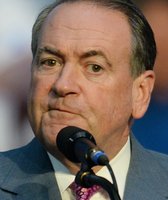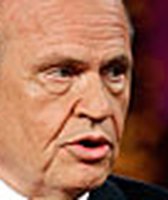Stand up for the facts!
Our only agenda is to publish the truth so you can be an informed participant in democracy.
We need your help.
I would like to contribute
SUMMARY: Rudy Giuliani presided over an economic rebound in New York City, but his claims ignore the nation's economic expansion. And he doesn't mention the less rosy details of his tenure.
Rudy Giuliani likes to brag about New York City's fiscal and economic performance during his eight years as mayor. The tax burden fell, government spending grew modestly, and city employment remained almost constant even as 13,000 teachers were added.
But having good things happen on your watch and being responsible for them all are two different things. And Giuliani avoids talking about some of the less appealing aspects of his fiscal policies. While careful in his wording about cause and effect, Giuliani has repeatedly linked his fiscal policies, including some tax cuts he initially opposed, with the economic growth New York City enjoyed during his mayoralty.
"When you reduce the burden of government," Giuliani said in Des Moines, Iowa, on June 20, "what happened is the unemployment rate was cut in half, the number of jobs grew ... the number of people that were working went up dramatically, and new businesses came back to the city."
He doesn't note, however, that his tenure as mayor, from Jan. 1, 1994 through Dec. 31, 2001, overlapped the longest economic expansion in U.S. history (March 1991 to March 2001).
Giuliani also boasts about the tax cuts that happened during his tenure. "Because he turned his conservative principles into action," says Giuliani's campaign Web site, "New York City taxpayers saved more than $9-billion in taxes and enjoyed their lowest tax burden in decades, while the economy grew and city government saw its revenues increase from the lower tax rates."
But there's more to the fiscal picture of Giuliani's tenure. Here are some other facts:
• The city's debt grew by 48 percent during Giuliani's tenure, according to the privately funded Citizens Budget Commission (CBC), and that required him to do some creative accounting to avoid a debt cap imposed by the state.
• Giuliani's final budget, prepared in June 2001 for fiscal 2003, left new Mayor Michael Bloomberg with a $3.1-billion budget deficit.
• Giuliani also benefited from growing federal spending on local governments and rising tax revenues overall, to the point that his spending grew by more than 6 percent a year in his second term. One of Giuliani's hallmarks, improvement in public safety, was buoyed by $400-million from President Bill Clinton's program to put more police officers on the streets.
The CBC was not enthralled with the city's economic performance as Giuliani finished his final budget, for the coming fiscal year of 2002.
"In recent years New York has been riding a wave of national prosperity, but not distinguishing itself with unique gains," the CBC said in a July 2001 report on New York City's competitiveness in comparison with 13 other major U.S. cities, such as Boston, Philadelphia, Detroit, Chicago and San Francisco.
Giuliani had a contentious relationship with both the CBC and the city-funded Independent Budget Office (IBO). Yet officials of both watchdog groups now have mellowed in their criticism of Giuliani. "I'd give him fairly high marks," says Douglas A. Criscitello, vice president at JPMorgan Chase Bank in Washington who headed the IBO from its beginning through 2000. "He tried to balance his spending priorities and desire to cut taxes and the need to bring the city's debt under control."
"There were really two Giulianis," says current IBO director Ronnie Lowenstein, who was Criscitello's deputy. "The first term there were some definite cuts to spending, in large part because the city was in an economic slowdown. The second term there was larger growth in spending." But she says, "Did he slow spending compared to his predecessors? Yes."
In April 1999, as Giuliani was preparing his sixth budget, CBC chairman Eugene J. Keilin warned, "The current economic recovery has simply not been used to shore up the city's finances." The CBC eventually gave Giuliani's fiscal year 2000 budget, finished in June of 1999, a grade of C, with D's for "budgeting responsibly" and "budgeting effectively," but a B for tax policy.
Giuliani boasts of turning a "$2.3-billion budget deficit into [a] $2.9-billion surplus by FY 2001." Indeed Giuliani cut city spending by $100-million in his first full fiscal year and did accumulate that surplus. But then, in his last year as mayor, he budgeted to spend it, says the CBC. And just as departing Mayor David Dinkins had left Giuliani a $2.3-billion budget gap for his first full fiscal year, as he departed Giuliani left incoming Mayor Bloomberg a $3.1-billion budget gap for fiscal 2003.
Giuliani's fourth budget director, Bob Harding, asked by the Giuliani campaign to address issues raised for this article, says Giuliani budgets often had deficits that, because of conservative revenue projections, invariably turned to surpluses before the year ended. Outside budget watchers confirmed the conservative nature of Giuliani's budgeting.
Overall, spending growth during Giuliani's second term averaged 6.2 percent a year, the CBC reports (3.8 percent in constant dollars).
Capital spending grew at about the rate of inflation under Giuliani. The CBC says Giuliani spent significantly more on environmental protection and education then the previous mayor, and less on hospitals, housing and transportation. Another area of reduced capital spending was "public protection," which is noteworthy because of criticism by some firefighters after the 9/11 attacks that their communications system was outdated.
While capital spending overall did not grow significantly during Giuliani's tenure, debt and interest payments on the debt grew from $29-billion in fiscal 1994 to $43-billion in fiscal 2002.
In its criticism of Giuliani's fiscal performance in April 1999, the CBC particularly noted the growth of debt. Today, though, the city's independent budget watchers say it was not a big concern.
Charles Brecher, executive vice president and research director at the CBC and a faculty member at New York University's Wagner School of Public Service, says the Giuliani administration devised ways of avoiding a state cap on debt: It shifted water and sewer debts to the separate water authority, and shifted some other debt to a new "Transitional Finance Authority, or TFA."
"We have a way of calculating the affordability of debt," Brecher said in an interview in October 2007. "We didn't find it was too far out of line."
Financial rating agencies seemed to agree. Harding notes that all three rating agencies – Standard & Poor's, Moody's and Fitch – gave ever-rising bond ratings to New York throughout Giuliani's tenure. Today, nearly six years after leaving office, what Giuliani talks about most is tax cutting – those "23 tax cuts" that have become part of his standard stump speech. He says the cuts saved "individuals and businesses more than $9-billion."
The $9-billion figure is the accumulated estimate of all 23 cuts during Giuliani's eight years in office. The CBC says the cuts had reached $1.56-billion a year as of fiscal 2002, or about 6.7 percent of the previous year's total tax revenue.
Whether Giuliani really deserves credit for all of those has been widely debated. He initially opposed several of the cuts, including a frequently debated cut in a personal income tax surcharge at the same time that he was proposing a new Yankee stadium in Manhattan. Harding says Giuliani "always was in favor" of eliminating the surcharge and was simply trying to get the City Council to tighten spending to offset the tax cut before he would sign on. He notes that eventually Giuliani and the council agreed on a budget with the tax cut in it.
Some cuts were made by the state's General Assembly, rather than the city of New York, although Giuliani says he lobbied for them. One of the prominent tax cuts, the state's so-called STAR program, used state money to replace a cut in local property and personal income taxes. The "cut" thus did not limit city spending.
More or less ignored in the debate is the extent to which most of the tax cuts were aimed at commercial interests, not individuals. Repeated reductions in the commercial rent tax account for $491-million, nearly a third of the $1.56-billion tax reduction, in 2002. At least two-thirds of the 23 tax cuts benefited businesses and commercial real estate.
Individual reductions included a weeklong sales-tax holiday on clothing that saved consumers about $7-million a year; a break on condo and co-op taxes saved about $250-million over three years, disappeared, then came back in 2002 to the tune of $185-million; and a marriage penalty reduction and tuition credit that produced unspecified savings on the city income tax. And certainly some of the overall relief in income and property taxes benefited individuals.
Another former budget director under Giuliani, John J. Lhota, says Giuliani "changed the terms of debate" over taxes. "By the time he left office, the same Democrat-dominated City Council that used to argue about which taxes to raise and how high to raise them began offering competing plans to cut taxes."
Of course, the zeitgeist of tax-cutting was as much a national phenomenon as economic growth. Bill Clinton campaigned for president in 1992 on a "middle-class tax cut."
Ultimately, Giuliani's budget management looks determined if not always as aggressive as he likes to imply. He also was lucky to be mayor in the mature years of a great economic boom.
Our Sources
Citizens Budget Commission, "Rudolph W. Giuliani's Fiscal Record as Mayor of New York City," June 6, 2007
Citizens Budget Commission, New York's Competitiveness: A Scorecard for 13 Metropolitan Areas, July 2001
Citizens Budget Commission, New York City Budget Report Card, Fiscal Year 2002
Eugene J. Keilin, chairman, Citizens Budget Commission, Letter to Mayor Rudolph Giuliani, April 15, 1999
Citizens Budget Commission, Managing the Budget in the Bloomberg Administration, December 2001
Giuliani Campaign Web site, Rudy Got Results as Mayor of New York City
Giuliani Campaign Web site, Rudy Makes Cents Day Five: Under Mayor Giuliani, New York's Private Sector Regained Its Strength
New York Times, Clinton, in a Visit, Offers $120-Million for New Officers
New York City Independent Budget Office, Fiscal Outlook 2001 to 2004
New York City Independent Budget Office, Debt Affordability in New York City (Prepared Testimony, June 3, 1998)
Interviews: Bob Harding, former Giuliani budget director; Charles Brecher, executive vice president and research director, Citizens Budget Commission; Douglas A. Criscitello, former executive director of New York City Independent Budget Office; Ronnie Lowenstein, executive director of New York City Independent Budget Office.





























